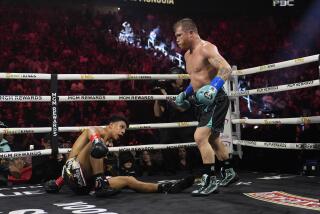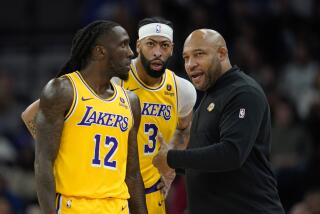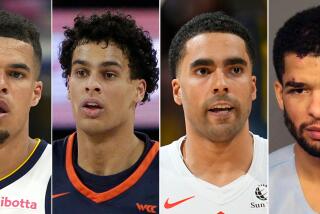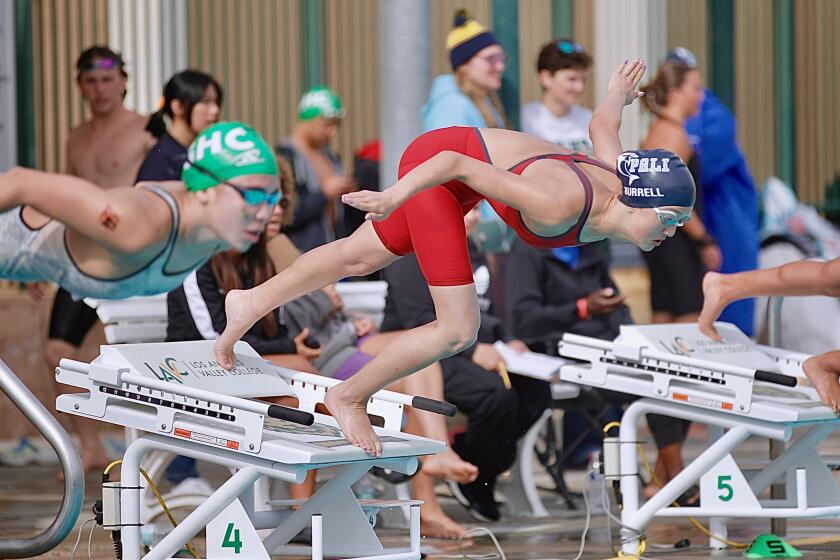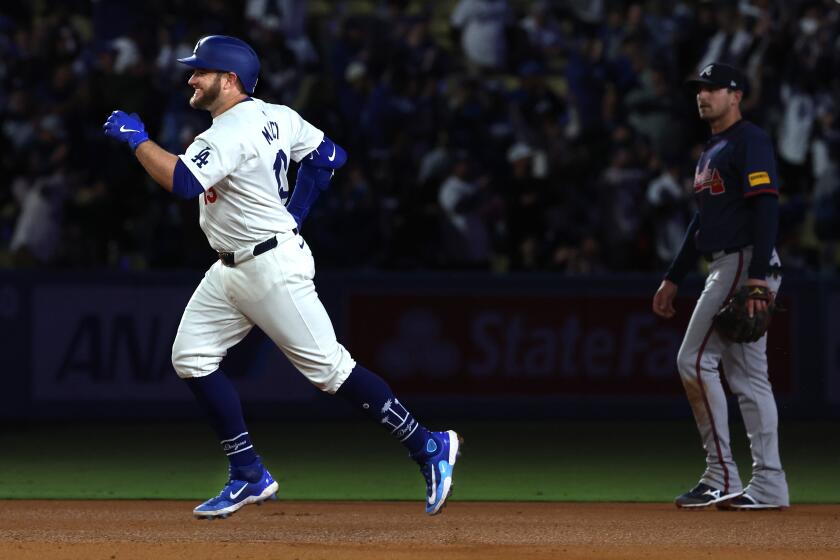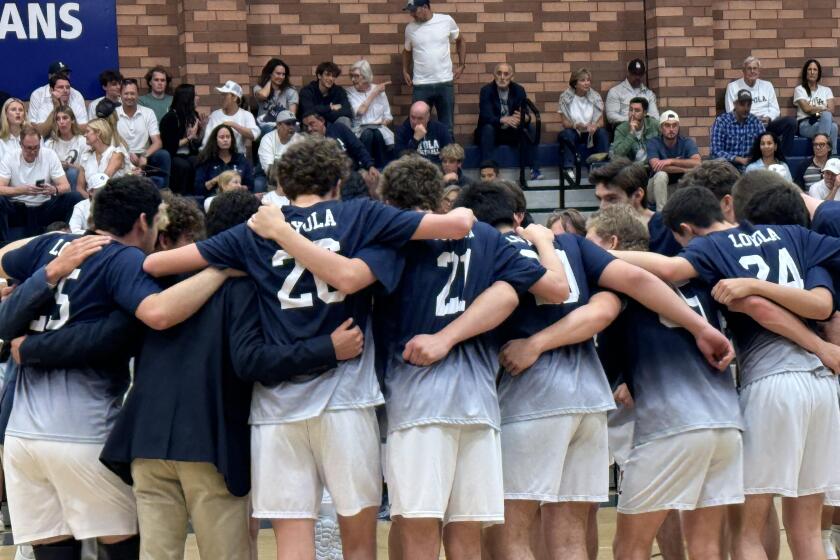Clearly, He’s Too Good to Be True
In one way we know too little about what Lance Armstrong is doing in the Tour de France. In another way we know too much.
What we don’t know scares us.
So we mostly ignore Armstrong and his wondrous accomplishments because what he is doing--riding a bicycle up and down hills in France--is strange to us. It is happening in an unfamiliar place, beautiful in a travelogue sort of way. But it is not happening in a stadium or arena. Most of it is being televised in a strange place, the Outdoor Life Network (OLN). Only viewers with satellite dishes or the very lucky ones with progressive cable systems offer OLN.
So when Armstrong pushed higher up the Alps last week, playfully playing possum with some of his strongest contenders, pretending he was laboring hard like everybody else until he blasted ahead, only his bulging veins gave any indication that he was working hard.
Then Armstrong got off his bicycle, tipped his hat and smiled. Many of the other competitors were vomiting or cramping or writhing in agony after having climbed L’Alpe d’Huez, the monster mountain peak. Armstrong was barely sweating.
On Saturday, Armstrong took the leader’s yellow jersey. Sunday, the last day the Tour spent in the mountains, Armstrong solidified his lead. The experts say that only an accident or an illness will keep Armstrong from winning his third consecutive Tour de France on Sunday in Paris.
But Friday night, a Los Angeles sports anchor informed us: “Lance Armstrong is still alive in the Tour de France.” This solemn pronouncement came after the baseball scores and British Open reports and the blaring headlines of the Lakers’ acquisition of Samaki Walker.
Still alive?
Well, yes, that was true. But there was no second sentence. Nothing to tell Los Angeles that Armstrong was poised to take the lead.
But what we do know scares us too.
We know of the drug scandals that have ridden hard over the reputation of international cycling. We’ve seen the video snippets of riders being rousted from their rooms and made to take drug tests.
Sports fans are cynical. We suspect a NASCAR race might have been fixed and that the son of icon Dale Earnhardt could not possibly have won a race on the track where his father was killed. We scoff at the idea that Cal Ripken really hit a home run in his last All-Star game. Chan Ho Park grooved him a fastball, didn’t he?
We’ve seen too many bad things, heard too many rumors and don’t want to be taken for saps. What if we allow ourselves to believe that what Lance Armstrong has done--conquered cancer and after that conquered the most grueling, mind- and energy-sapping sports contest we have--wasn’t a true triumph of the human body and spirit but another falsehood, a victory aided by artificial enhancement?
It is becoming harder and harder to invest ourselves in any team or athlete. The team might be sold or owned by a faceless corporation. The athlete might end up on the police blotter or be something more ordinary--a mercenary who cares not for the fans or the jersey but only for the money.
And if it is harder and harder to find pure joy in the sports we know, what is the point of searching for it in the sports we don’t know?
The first year Armstrong won the Tour, his bad luck was to triumph in the same year the U.S. women’s soccer team captured our summer love and won the World Cup. And maybe we heard Armstrong’s story of overcoming a virulent form of testicular cancer that had spread to his brain, and not believed it. Or maybe it was all too unreal. But Armstrong’s triumph did not register for very long.
Last year, when Armstrong won the Tour again, he was just another favorite winning what he should have. And there were whispers from Europe that Armstrong and his U.S. Postal Service team must have been using performance-enhancing drugs. The nasty whispers stuck with us, the nagging feeling that no human could have survived the cancer Armstrong endured and performed these otherworldly heroics on a bicycle.
Now Armstrong is poised to win again.
This year his sport has almost disappeared. Last year, ESPN at least showed a bit of the race every day and most of us could see it. Now OLN shows much more of the race but not nearly as many people get the network.
So Armstrong triumphs and we yawn. Or we are afraid to care. Or we don’t understand what we are seeing.
A hundred years from now, the world probably will celebrate Armstrong and his athletic achievements ahead of Shaq and Kobe, Michael and Magic, McGwire or maybe even Tiger. A hundred years from now what we are seeing Armstrong do might be considered one of the greatest athletic achievements ever.
But for now, it would require an almost un-American approach to appreciate what this 29-year-old Texan is doing. We would have to pay attention for three weeks.
We complain that a three-hour baseball game is too long. We can’t produce world-class runners who want to travel much more than 400 meters. We need our TV timeouts.
And yet maybe the best thing Armstrong can give us back is our naivete. Maybe we need to believe in this man, that he tells us the truth when he says in his commercial, “What am I on? I’m on my bike.”
We need to believe that a guy from America spent more time climbing hills on his bike than any of the guys from France. We need to see only the sportsman--the Armstrong who waited for his closest competitor after that man had ridden off the road and down a hill--and the man who raised his hands skyward to honor a teammate who died in this race six years ago.
Maybe Armstrong is winning over and over again to give all of us a chance to believe again what sport can be about.
*
Diane Pucin can be reached at diane.pucin@latimes.com
More to Read
Get our high school sports newsletter
Prep Rally is devoted to the SoCal high school sports experience, bringing you scores, stories and a behind-the-scenes look at what makes prep sports so popular.
You may occasionally receive promotional content from the Los Angeles Times.
